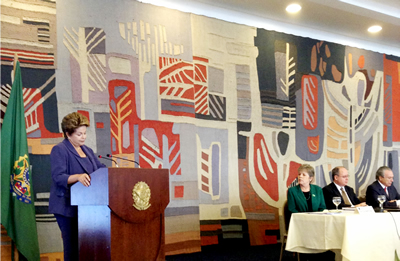ECLAC Calls for Equality Covenants in Latin America and the Caribbean
Topic(s)
The Commission's Executive Secretary, Alicia Bárcena, addressed an international seminar on development, which was also attended by President Dilma Rousseff.

(18 July 2013) Speaking in Brasilia, Brazil, the Executive Secretary of the Economic Commission for Latin America and the Caribbean (ECLAC), Alicia Bárcena, highlighted the need to move forward with social and fiscal covenants in Latin America and the Caribbean, in order to consolidate equality, diversify the economy and improve the distributive impact of public policies.
On Wednesday, Ms. Bárcena took part in the International seminar on development, which was organized by Brazil's Economic and Social Development Council (CDES) to mark its tenth anniversary. Speakers included President Dilma Rousseff, who referred to the various structural reforms under way in her country, which are aimed at continuing along the path of growth with equality.
The aim of the meeting, held at the Itamaraty Palace (which is the headquarters of the Foreign Affairs Ministry), was to reflect on the challenges of global governance and the Brazilian model. The meeting was attended by government officials, civil society representatives and international experts.
Ms. Bárcena gave an overview of the region's socio-economic situation, describing aspects such as the effects of the international economic crisis on growth, capital flows and inflation.
In her address, the ECLAC Executive Secretary stated that "outlining our region's future involves recognizing that equality must be our main guiding ethical principle and the ultimate objective".
The senior official informed participants of ECLAC's proposal to the region of structural change with equality, to ensure sustained economic growth, equality rights and environmental sustainability. She emphasized the fact that "Brazil and Latin American can increase and improve growth, and the paradigm for this must now be equality for growth and growth for equality".
According to Alicia Bárcena, "Structural change can only be achieved with equality covenants. We need a new market-State-society relationship, whereby each country defines its own mechanisms. We must urgently renew fiscal covenants and mutual trust between the State and citizens". This is because "tax collection in the region is low and inefficient".
In 2012, ECLAC launched the document Structural change for equality: an integrated view of development, which deepened the reflection that began in the document Time for equality: closing gaps, opening trails, which was presented in the Brazilian capital in 2010.
According to Ms. Bárcena "inequality conspires against development, security, investment and against everything", adding that the region "is rethinking its development models to prioritize increases in productivity, innovation and the creation of quality jobs".
The Executive Secretary called on the region's countries to invest in education and research and development, as well as prioritizing natural resource governance and moving towards solidarity-based regional integration.
Ms. Bárcena declared that a politically legitimate State is one capable of proposing a future development path and coordinating stakeholders around far-reaching projects.
She stressed that the equality agenda "is not a voluntary paradigm, it is not yet another good idea thought up by people in a room, but rather it is the expression of the will of our peoples, the voice of our times, the act of listening to the demands on the street, in the fields and throughout our shared homeland".
The seminar was also attended by Deputy Executive Secretary of ECLAC, Antonio Prado, and Director of the ECLAC Office in Brazil, Carlos Mussi.
Any queries should be sent to the ECLAC Public Information and Web Services Section.
E-mail: prensa@cepal.org; Telephone: (56 2) 2210 2040.
Follow us on: Twitter, Facebook, Flickr and YouTube
Country(ies)
- Latin America and the Caribbean